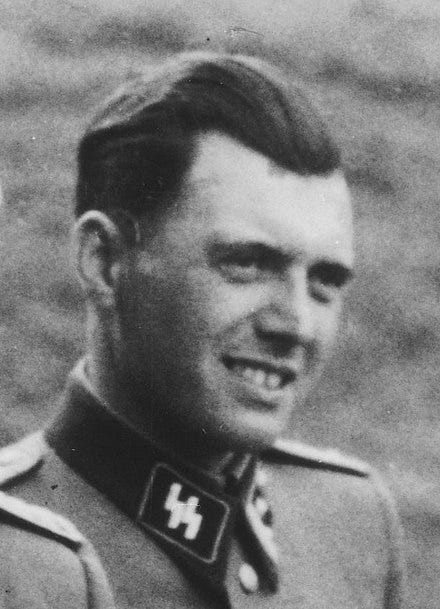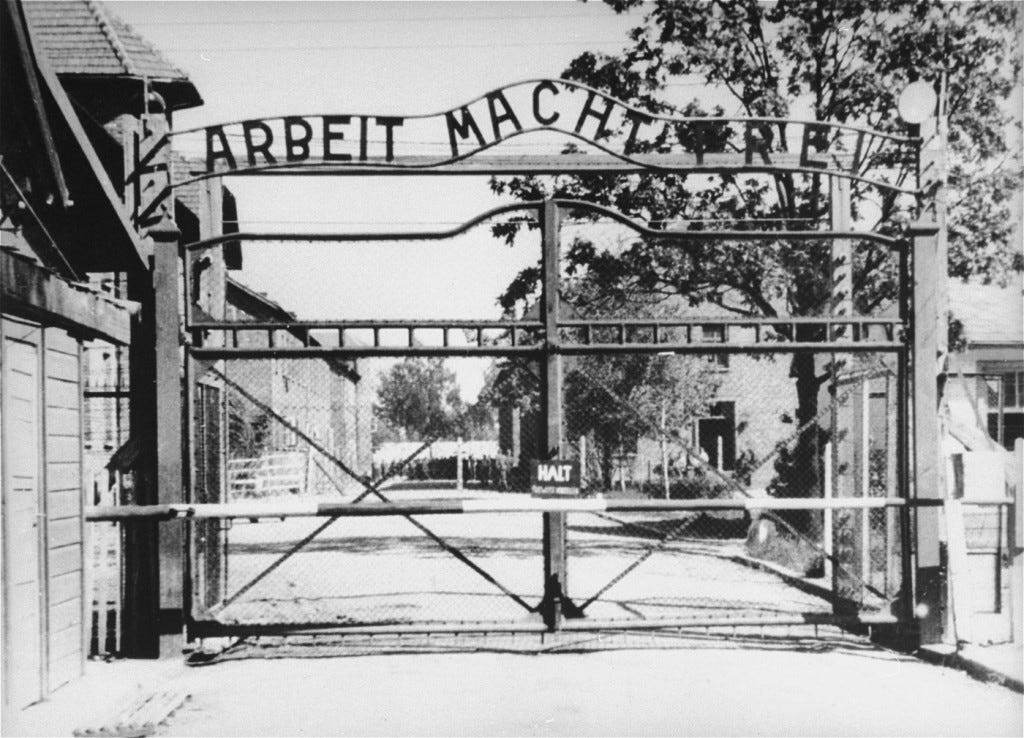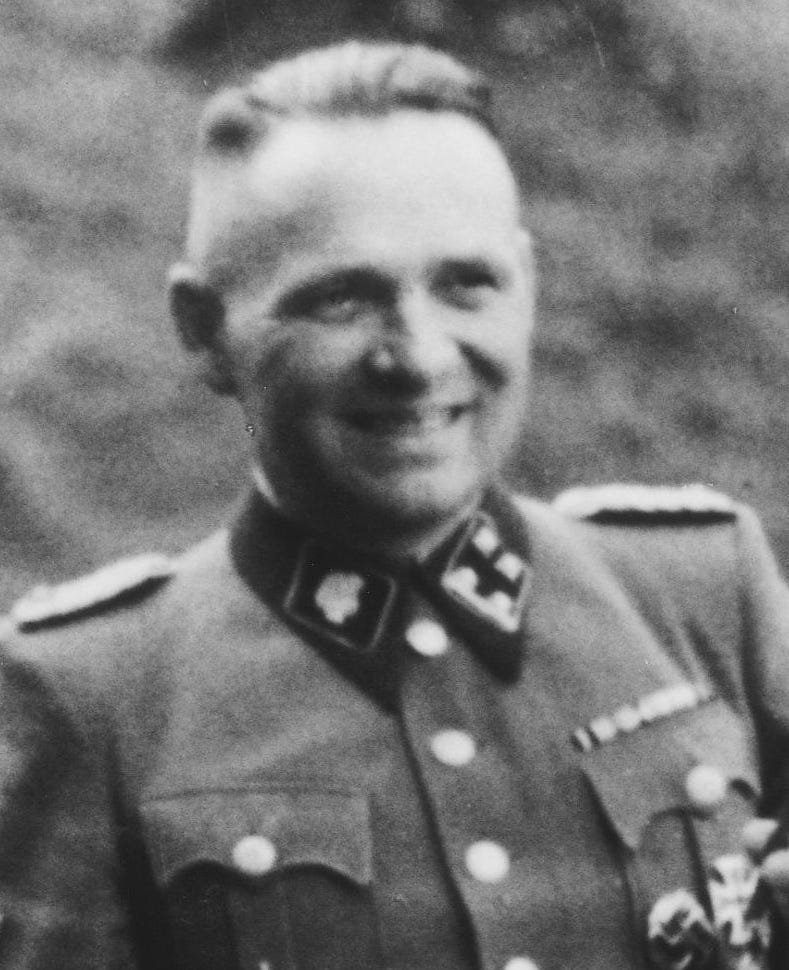Selected to Work - in Auschwitz
14th September 1943: Concentration camp prisoners are 'selected' by Josef Mengele - and a route to survival opens up
Benjamin Jacobs1 was already a veteran of Nazi labour camps. He and his family had first been carted off from their small Polish village in May 1941. They had survived a succession of different work camps.

In late August 1943 he and his family were deported again. This time, after a long train journey 'traumatized, starved, and soaked with human waste', they arrived at Auschwitz, where they already knew that Jews were being put to death. A dark smoke hung over everything, the atmosphere laden with doom.
According to the normal pattern, only 25 per cent actually passed into the camp. That meant that in the two weeks since we arrived, more than forty thousand people had been transported to Auschwitz.

Jacobs survived the initial selection by 'the highest-ranking SS officer, [who] wore a spiffy black uniform with a doctor's badge'. He later learnt this was Josef Mengele. Jacobs was valued because he was a dentist and appeared relatively strong. By chance he managed to pull his father from the ranks of those condemned to be gassed immediately.
It was just the beginning of a new series of torments:
The Auschwitz veterans looked upon us as greenhorns. They answered all of our questions with questions of their own. When I asked a Kapo's aide where I could wash some of my clothes, he answered, "Where do you think you are, in a sanitorium?"
More people kept coming. We saw tattooed numbers upward of 150000. That meant that almost ten thousand people had been brought here since we had come. According to the normal pattern, only 25 percent actually passed into the camp. That meant that in the two weeks since we arrived, more than forty thousand people had been transported to Auschwitz. I wondered about the women's camp and the fate of Balcia and all the others.
…
Another day we heard that there was no further need for inmate workers and we weren't to go anywhere. This was the worst news we could have been told. Being unneeded meant being dispensable. Passing Dr. Mengele's selection was just a temporary reprieve, we thought. We already knew that to remain alive we had to keep working. Being idle beyond a certain point was a threat to our lives. I was no longer optimistic that we would ever leave Auschwitz alive. After the years of living on the edge of existence, we were resigned to whatever fate had in store for us, and we didn't look at our lives in any long-term way.
One day the Kapo kept us outside in the cold rain for more than an hour. When we finally got back into the block, we were dripping wet. We hung our clothes around the room to dry. When the Kapo noticed, he asked us who had had that idea. Since we all did it simultaneously, no one admitted guilt. Then he ordered us to go outside naked and circle the block. As we passed by him standing at the door, he swung his whip at us.
Mendele was hit badly, but even though some lashes on his back drew blood, he didn't whimper. I thought this teenager's heart was made of stone. Looking around and seeing the rain dripping off of us, I thought of cattle in a pasture. Here we were treated alike, driven, herded, and even branded like cattle. Later one of the prisoners, Moishe Chernicki, came down with a fever and was taken to the infirmary. No one ever saw or heard from him again.
We had been in this isolation for more than two weeks. The draconian rations barely kept us alive. When the sun didn't shine, the camp was draped in the black of the rising smoke. There had not been a shortage of courage before, but now we were at our lowest point ever. Reality seemed twisted and out of shape. At times we stared into space.
Some wandered around the barracks in loneliness. Although we had passed Dr. Mengele's selection, we were destined to flunk life anyway. Suicides, though, were rarely heard of here. Only a few Jewish inmates succumbed in this way. Perhaps our generation's experiences had endowed us with extra ability to endure. The undaunted believers still prayed every day. It amazed me how they still remembered word-for-word the various prayers of shaharith, minhah, and maarib - the morning, afternoon, and evening liturgies.
Then a number of civilians came to the block. They were accompanied by Hauptsturmführer Rudolf Höss, the Kommandant of Auschwitz. The consensus of our block supervisors indicated that they were from I.G. Farben, a large German pharmaceutical company that already employed prisoners in the nearby Buna camp. At Buna, the I.G. Farben Company was making synthetic rubber. There, we were told, the inmate death rate was very high, and they had a continuous need for replacement workers. We believed that it could only be better than our present situation. We just wanted to get out of here.
Finally we got orders that we would leave the camp. A little after five the next morning, we were each given leather shoes with wooden soles to replace our clogs. After roll call we were given a generous portion of bread and were lined up. There were eight hundred of us who would be workers and twenty-five other prisoners, including Richard Grimm, who would take charge of us.
We did not know where we were going. Except for Grimm, all the others had low prisoner numbers. The lowest I recall seeing was on Klaus Koch, who became our cook. Coincidentally, an SS man by the same name turned out to be his boss. Most of the workers wore green triangles, the color designated for criminals, but there were also political prisoners and even one homosexual bearing a pink triangle patch.
As we left, Josek and I walked on either side of our father. I looked up and saw the paradoxical Auschwitz sign, "Work makes you free." By leaving Auschwitz, I felt that we had a new lease on life.A large group of people were being led into the camp. They were gypsies, and I had to think of the contradiction, that they, people who loved so much their free spirit, were also chained in Auschwitz.
...
It was the late summer of 1943, and to have escaped the Quarantine Block at Auschwitz alive was a metaphor for freedom. Our fate, we thought, had changed. We had been close to being pushed off the cliff, and now we had a new lease on life. I felt resentful as we passed people who were still allowed a near-normal life, and wished I was not born a Jew.
The Dentist of Auschwitz is available to read online at Nizkor - “It is Mr. Jacobs’ intention to see his work read by as many people as possible.” It is also available in print.




